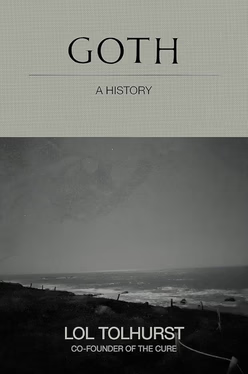Goth
A History

Former Cure drummer and keyboardist Lol Tolhurst chronicles the Goth movement from its historical roots, through its post-punk inception to modern day.
Tolhurst divides his coverage into three parts, “Origins”, “Eternals”, and “Legion”. “Origins” sees him trace the movement’s historical influences to literary figures like T.S. Eliot and Sylvia Plath, and musical predecessors like Alice Cooper, Marc Bolan and David Bowie.
“Eternals” covers Goth’s emergence out of the post-punk scene via pioneers such as Joy Division, Bauhaus, Siouxsie and the Banshees, and The Cure through their first four albums. This section shines, with Tolhurst proffering first-hand recollections of his time with the Cure recording their landmark albums in between touring with the Banshees. As such, the section feels almost like a digression from Tolhurst’s prior memoir, Cured.
“Legion” covers the movement’s explosion, including bands like Sisters of Mercy, The Damned, and All About Eve, London’s Batcave nightclub, through to modern standard bearers like Nine Inch Nails. A standout anecdote sees Tolhurst relate how he finally sought help for his alcoholism at the Priory Hospital in London. To his surprise, he spies a familiar face amongst the patients, Andy Fletcher from Depeche Mode, who’d sought help for his spiraling depression. Not only is this anecdote unexpected, it’s poignant given Fletcher’s recent passing in 2022 at age sixty.
First-hand accounts like this shine, but Tolhurst struggles when he veers into more academic territory. A chapter on literary ancestors, for example, reads more like an appreciative essay than a scholarly treatise. Tolhurst himself seemed wary of this, writing in the afterword:
At first, I approached the subject matter of Goth: A History in a more traditional way; I felt I should write a comprehensive encyclopedia of the times. I thought hard and long on this for a year or so. I finally realized I am no historian and neither do I want to be one.
One senses Tolhurst was trying to express his personal connections to these authors, but his approach feels clumsy compared to his coverage of Depeche Mode, which emerges out of his own first-hand narrative.
This misstep aside, Goth offers a “further-reading” style digression for fans of Cured, or anyone who found the movement during their formative years. Those new to the movement, however, should start with the music. The history will wait.
Reading History
- 2024Nov8FriAudiobook
Read over 15 Days
- 25 Oct 202414%
- 26 Oct 202417%
- 27 Oct 202460%
- 4 Nov 202471%
- 8 Nov 2024Finished